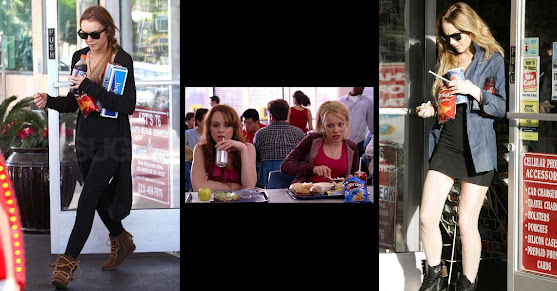Crisp (pronounced krisp)
(1) Hard
but easily breakable; brittle (applied especially to food).
(2) Firm
and fresh; not soft or wilted (applied especially to food).
(3) Brisk;
sharp; clear; decided (applied often to the delivery of words).
(4) Lively;
pithy; sparkling.
(5) Clean-cut,
neat, and well-pressed; well-groomed.
(6) Invigorating;
bracing (usually of the air).
(7) Crinkled,
wrinkled, or rippled, as skin or hair.
(8) A
snack food, made usually from thinly sliced potato (called chips in some markets).
(9) In
cooking, a dessert of fruit, as apples or apricots, baked with a crunchy
mixture, usually of breadcrumbs, chopped nutmeats, butter, and brown sugar.
(10) In
computing theory, not using fuzzy logic; based on a binary distinction between
true and false.
(11) In
wine criticism, having a refreshing amount of acidity; having less acidity than
green wine, but more than a flabby one.
Pre 900: From the Middle English crisp (curly), from the Old English crisp (curly, crimped, wavy" (of hair, wool etc)), from the Latin crispus (curled, uneven, wrinkled; having curly hair); a doublet of crêpe, crispus was from the primitive Indo-European sker- & ker- (to turn, bend) and cognate with crīnis & crista. The Old French crespir is related but the English forms came via Latin. Crisp is a noun, verb & adjective, crisply is an adverb, crisper & crispest are adjectives, crisped & crisping are verbs and crispness & crispation ((1) The act or process of curling, or the state of being curled or (2) a slight twitch of a muscle (both archaic)) are nouns.
The sense of "brittle" may have run in parallel with other meanings but wasn’t recorded until the 1520s and didn’t become a commonly used form until the early nineteenth century, the reason for the sixteenth century evolution unknown but presumably based on the characteristics assumed by certain foods when cooked. The figurative use to describe something (usually someone) having a "neat, brisk, having a fresh appearance" dates from 1814 and the use to speak of air as “chilly or bracing" apparently didn’t appear until 1869, perhaps surprising give the way earlier romantic poets trawled the language for adjectives. As a noun, crisp was used from the mid-fourteenth century, originally the name of a light, crinkly material formerly used for kerchiefs, veils etc and a few decades later it was applied to a kind of pastry and by the 1820s, it was a common form of speech by cooks (often a jocular euphemism for "burned to a crisp") to describe anything over-cooked. Potato crisps, although recipes were circulating in the US as early as 1824, first went on sale in 1897, marketed simply as crisps by 1935 although, in the US, crisps began in 1903 to be used in trade names of breakfast cereals. The verb crisp (to curl, to twist into short, stiff waves or ringlets (of the hair, beard, mane etc)) was a late fourteenth century derivation from either the adjective or else from the Old French crespir or the Latin crispare, both forms from adjectives. It was use to mean "to become brittle" after 1805. The adjective crispy dates from the late fourteenth century in the sense of "curly" and from the 1610s it could also mean "brittle".
Crisps, chips and freedom fries
About the only place where the names of fried potato snacks proved linguistically controversial was the US when, in the run-up to 2003 invasion of Iraq, after finding the French support for the action insufficiently enthusiastic, the chairman of the committee in charge of operations in the Capitol complex ordered the word "French" removed from all menus, French fries becoming freedom fries and French toast, freedom toast. It was an echo of one of Washington’s earlier linguistic assaults when, upon the entry of the US to the war in 1917 (which was the act which saw it in 1919 named The World War), German measles had been dubbed liberty measles, hamburgers had become liberty steaks and sauerkraut, liberty cabbage. Then, even German shepherd dogs had been thought subversive and thus re-named Alsatians although there's no record of the Bush White House taking action against French poodles. From the Quay d'Orsay, the French Foreign Ministry seemed unimpressed, noting they weren’t devoting much attention to potatoes and that French fries were anyway invented in Belgium in the seventeenth century. In Washington DC, quietly in 2006 the name changes were reversed.
Stocking up on chips: Lindsay Lohan buying Doritos Nacho Cheese chips and other essential groceries, Los Angeles, 2008. It's not known if her fondness for Doritos (Doritos the singular, plural and collective form, a single chip being "a Doritos chip") was formed or strengthened by them being on the product-placement list for Mean Girls (2004).
Stocking up on crisps: Lindsay Lohan with former special friend, Samantha Ronson, London, 2008.




No comments:
Post a Comment